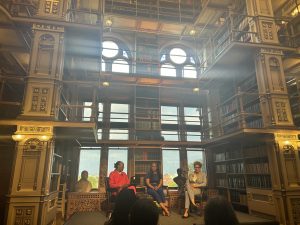Social justice advocates spotlighted attacks on education and emphasized inequalities in the criminal justice system at a panel Georgetown University’s Racial Justice Institute hosted on April 15.
The institute, an interdisciplinary research hub focused on creating and inspiring racial justice, coordinated the panel as the final installment of a four-part series of discussions titled “Advancing Racial Justice in the Storm.” The series aimed to inspire deeper thought and scholarship on the path to racial justice and the building of a truly representative democracy through discussions of education, family autonomy, well-being and voting rights.
Nicole Austin-Hillery, president and CEO of the Congressional Black Caucus Foundation – a nonprofit that seeks to advance the Black community through education, policy, research and leadership development – moderated the event, opening the conversation by recalling a quote about the importance of fearlessness when discussing race.
“I remember that former Attorney General Eric Holder said that when it comes to issues of race, we’re a nation of cowards,” Austin-Hillery said at the event. “I saw it as a motivating statement to say to us that it is okay, and we should not be afraid to have these conversations, and that we should not be afraid to face what clearly is a part of our history here in this country.”
The final panel discussion coincided with the 70th anniversary of Brown v. Board of Education, the landmark U.S. Supreme Court case that declared that racially segregated education violated the Equal Protection Clause of the Constitution – which guarantees all U.S. citizens equal rights – this May.
Panelist Sheryll Cashin, a professor of law, civil rights and social justice at the Georgetown University Law Center (GULC), said the modern American political and educational systems fail to live up to the intention behind the Brown v. Board decision.
“The vision of Brown v. Board was to cultivate a space where people of all color would be educated together, and frankly, learn to live together and have institutions that everybody had equal access to,” Cashin said at the event. “That was the vision, and that vision is betrayed every day.”
“We have a separate and unequal system and it colors politics, and right now, the public school is under attack. It’s being demonized as a source of indoctrination,” Cashin added.

Monique Worrell, a criminal and social justice reform advocate and the second African-American woman to assume the position of state attorney in Florida, commented on the education system and the current political situation in her home state.
In July 2023, the Florida State Board of Education approved new African American history standards that teach students that some Black people benefited from slavery. The previous January, the state’s Department of Education banned the teaching of AP African American Studies. Florida’s Republican governor, Ron DeSantis, signed a bill into law May 2023 that banned the state’s public colleges and universities from spending money on diversity, equity and inclusion programs.
DeSantis champions these policies as part of a “war on woke.”
Worrell said that the conservative “war on woke,” or the assault on progressive values and policy, is an attack on the Black community.
“What we see in Florida and through red states across the country is this ‘war on woke,’ and essentially the war on woke is another way of saying the ‘war on Black,’” Worrell said at the event.
DeSantis suspended Worrell from her position as a state attorney in August 2023, saying she avoided the minimum mandatory sentences for gun crimes and drug charges and allowed juvenile offenders to avoid serious charges and incarceration.
Worrell said that racism and bigotry permeate the criminal legal system, causing attacks on Black prosecutors like herself.
“If we take the system back to where it began, where did policing begin? With slave-catching patrols,” Worrell said. “So that history is baked into racism, bigotry and slavery, and the modern-day criminal legal system is exactly that.”
Cashin said an important way to change this system and preserve democracy is by voting in the upcoming presidential election.
“You cannot not vote; I am not going to tell you who to vote for, but we are in an existential crisis,” Cashin said. “This election is really about whether our democracy as we imagine it is going to survive.”
Worrell urged the audience to begin expanding outside of their comfort zones to advocate for racial justice.
“You’re not an ally if you’re cheering me on,” Worrell said. “You’re an ally if you’re going to stand on the front lines with me when they bring out the water hose. You have to go beyond what’s convenient for you.”
Caleigh Keating contributed reporting.


